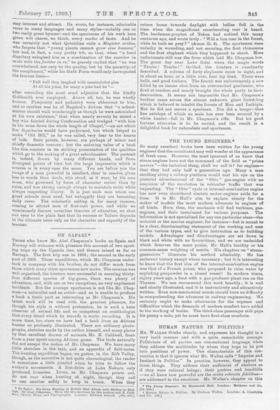THE YOUNG ENGINEER.*
So many excellent books have been written for the young engineer that the uninitiated may well wonder at the appearance of fresh ones. However, the most ignorant of us know that steam-engines have not the command of the field as "prime movers "—the technical slang, shall we call it P for engines—. that they had only half a generation ago. Many a man strolling along a railway platform would cast his eye on the pictorial advertisement of the " Otto" gas-engine with no suspicion of the revolution in vehicular traffic that was impending. The "Otto" cycle or internal-combustion engine has now even shouldered electric motor-engines aside for a time. It is Mr. Hall's aim to explain clearly for the maker of models the most modern advances in engines of all kinds. Here, then, the mechanic will find turbines, gas- engines, and their instalment for various purposes. The information is not specialised for any one particular class—the motorist or the marine engineer, for instance—but is meant to be a clear, discriminating statement of the working and uses of the various types, and to give instruction as to building models. Advantages and disadvantages are set down in black and white with no favouritism, and we are undecided which deserves the more praise, Mr. Hall's lucidity or his common-sense weighing of merits. Hie chapters on "steam- generators " illustrate his method admirably. He has eschewed history except where necessary ; but it is interesting to know that the first idea of the internal-combustion engine was that of a French priest, who proposed to raise water by exploding gunpowder in a closed vessel! In modern times, eighty years ago, a boat with a gas-producer plant ran on the Thames. We can recommend this work heartily ; it is well and clearly illustrated, and it is instructively and attractively written. Even non-mechanical minds should have no difficulty in comprehending the advances in railway engineering. We certainly ought to make allowances for the expense and difficulties which the demands of modern comfort have added to the working of trains. The third-class passenger still pays his penny a mile, yet he must have first-class comforts.






































 Previous page
Previous page